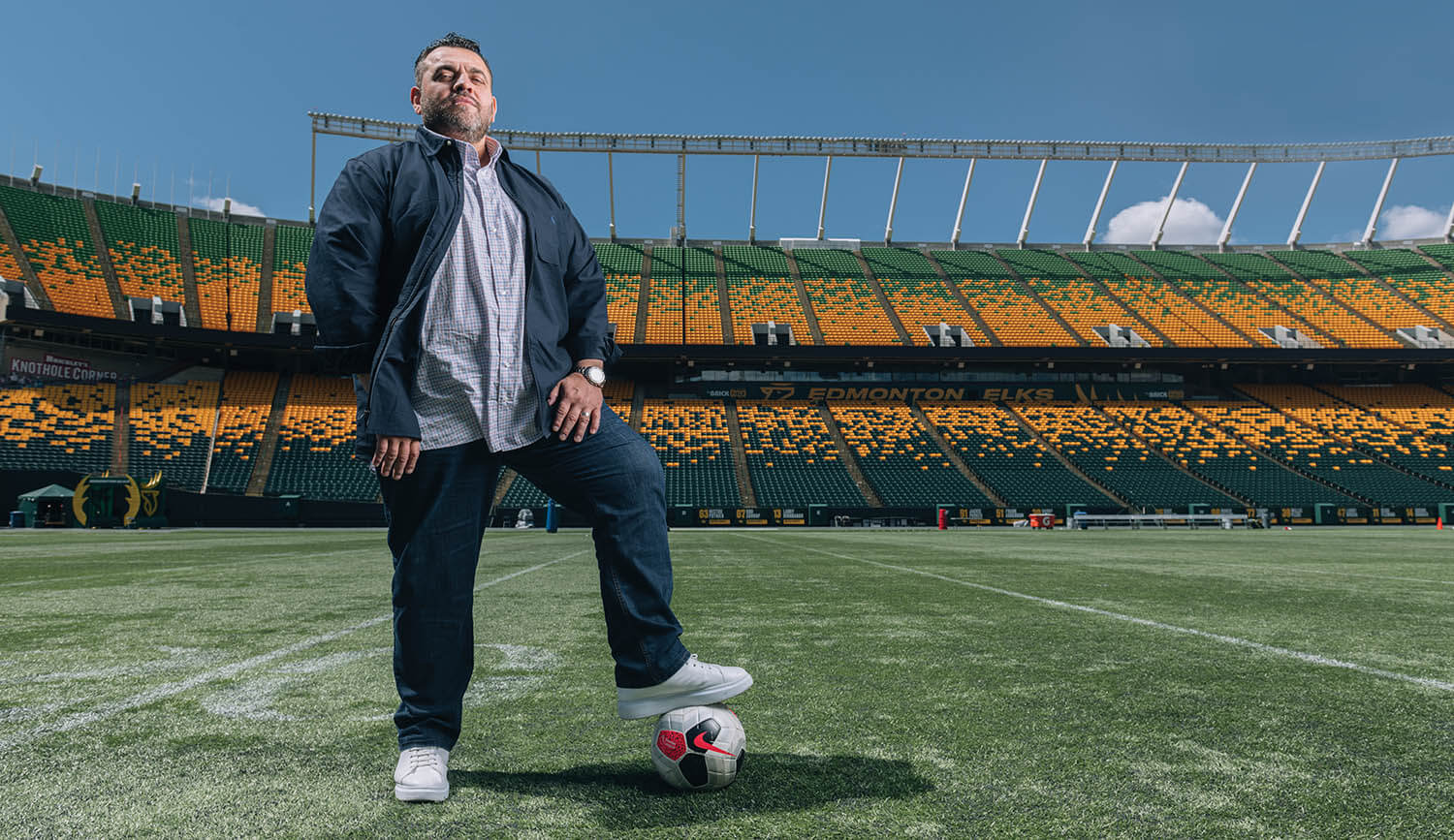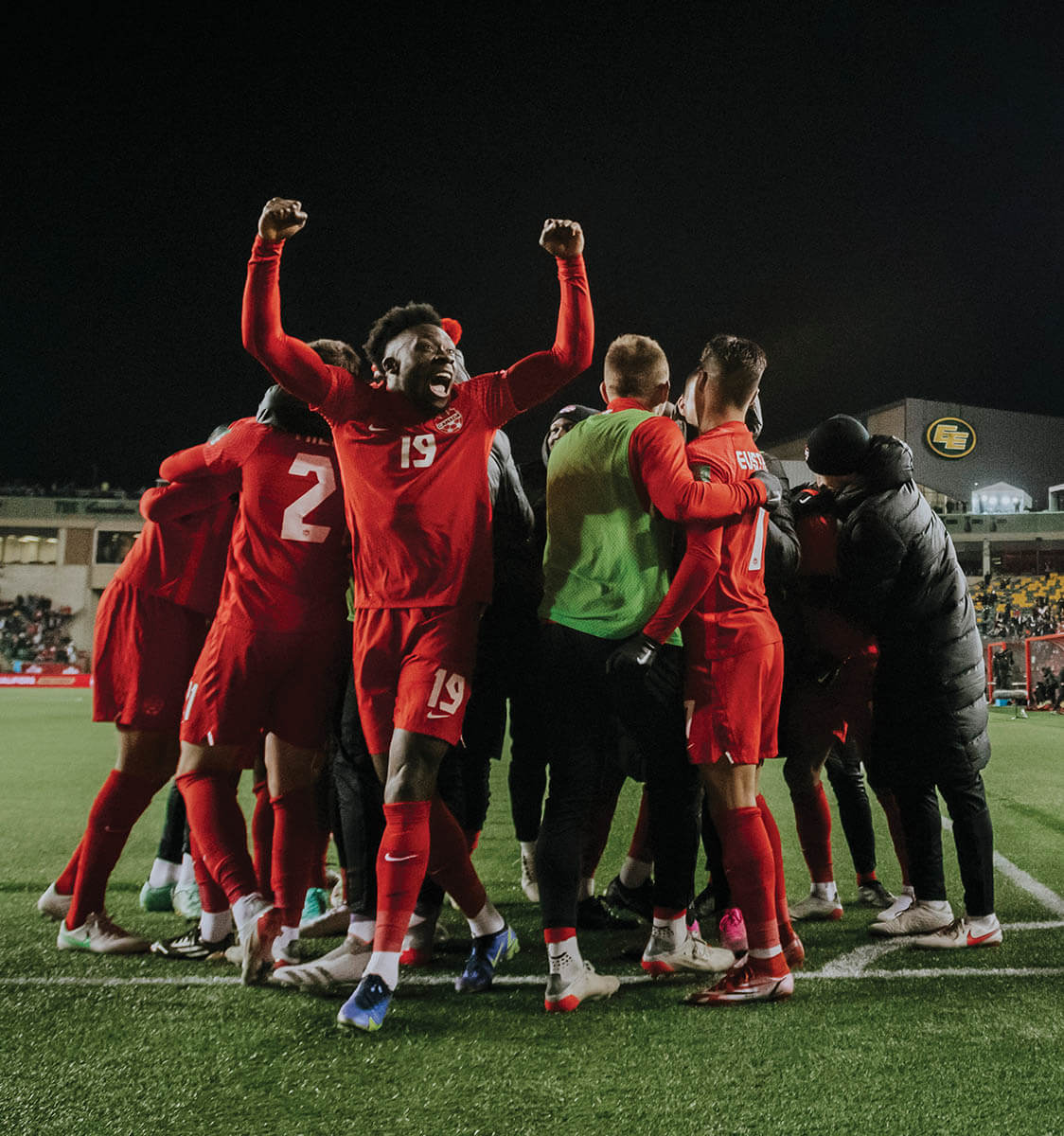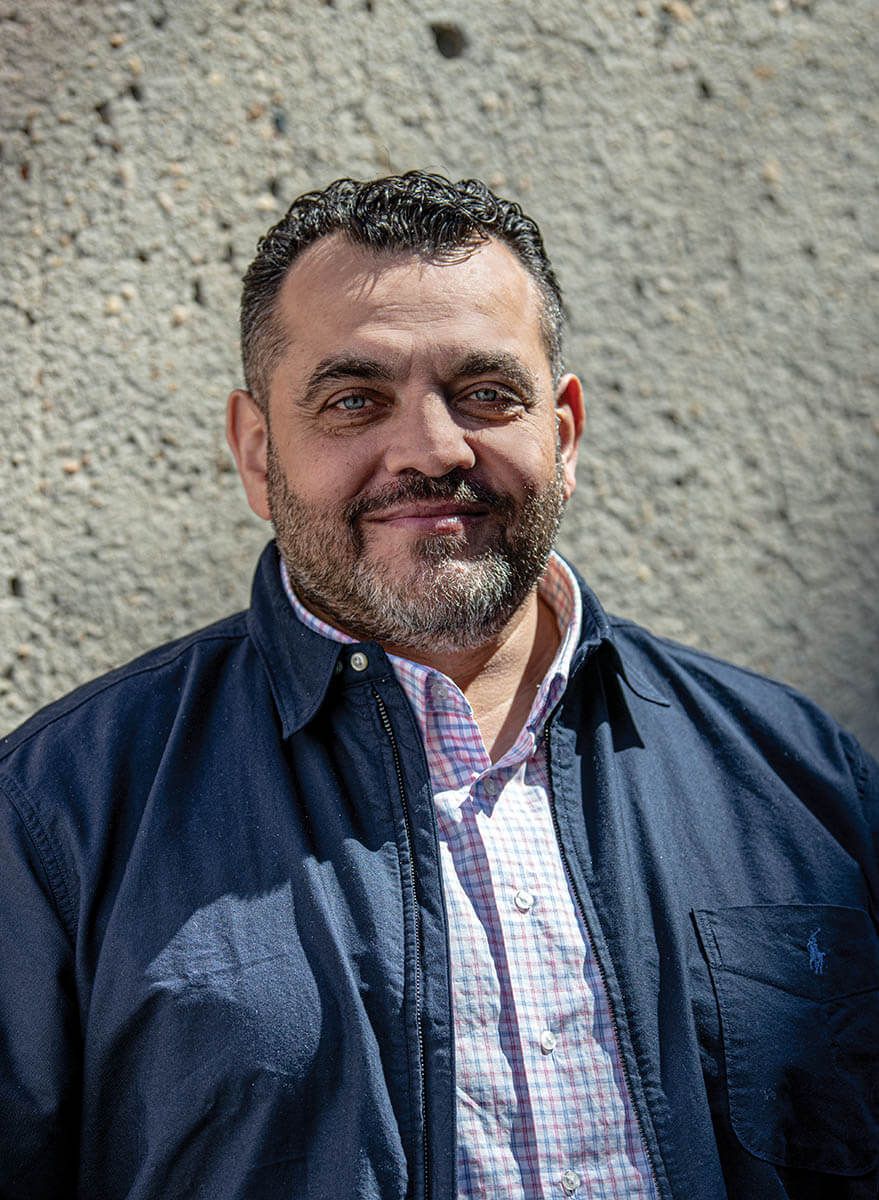
Nedal Huoseh remembers what he thought when he watched Jerry Maguire, the famous movie about a fictional super sports agent. Huoseh didn’t think “show me the money.” Just the opposite.
“I thought, wow, I never want to do that job,” recalls Huoseh, as he sits in his second-floor office that overlooks a St. Albert industrial park. He apologizes for not being able to offer refreshments; the sun shines brightly through the windows, and we are in the midst of Ramadan. He gets up from his chair to shake my hand, and comments on his surgically rebuilt knee — “I should have had this done years ago.”
Today, Huoseh has a dozen clients playing with soccer clubs across North America and Europe. He has a second home, in Turkey, so he can spend significant chunks of time closer to some of his clients, including Alphonso Davies, who, at 21, is already the most globally recognized athlete Edmonton has ever produced.
There are hundreds of Nedal Huosehs in Edmonton. Soccer parents. Coaching their kids. Making sure players have rides to games. Running practices and running chips on casino nights. Wearing club-issued track pants that are too tight for middle-aged dad bods.
That was a dozen years ago. Huoseh was coaching at Strikers, where his son, Adam, played. And, they’d see a kid from a rival club torching them over and over. A kid by the name of Alphonso Davies, a nine-year-old whose family had come to Canada as refugees.
Adam and Davies became friends. And, eventually, they’d play on the same team.
The business Huoseh founded, ASI Tech, was successful enough that he could put money back into the team. He got permission from the club to buy new jerseys for the kids he coached. He covered registration fees for kids who couldn’t afford it. He told Davies’s parents that all Alphonso had to do was to come out and play. He would pick up a number of kids whose parents couldn’t drive them to games.
“Don’t worry about his boots or his fees — they are covered,” Huoseh told Davies’ parents. “If he wants to come play here, it’s up to him. No matter what happens, his son and I are still friends. He is always welcome at our house.”

As the son of refugees, Huoseh felt a kinship with families who had just arrived in Edmonton, who couldn’t drive their kids to practices or weekend tournaments because they worked two jobs and were on duty on Saturdays or Sundays. Or they didn’t own their own cars.
“I can relate to these people and their stories,” he recalls. “My father came to Canada as a refugee. We’re Palestinian. He lived in a refugee camp for 10 years.”
It wasn’t long till Davies got noticed by those outside the city. There are legends of him wowing people while playing at St. Nicholas Junior High. And the Vancouver Whitecaps of Major League Soccer were interested after sending scouts to see the kid play multiple times.
Then came the offer: The Whitecaps wanted Davies to move to Vancouver, to join the club’s academy. That is, he’d play for their youth team as an amateur, while going to school in Vancouver. He would get professional coaching and the chance to move up to MLS.
But, his parents were unsure. They couldn’t go with their son and feared he wouldn’t finish school. But Huoseh’s professional life meant plenty of business trips to British Columbia, so he promised the Davies family that he’d regularly check in on Alphonso.
Nick recalls that Alphonso’s mother, Victoria, had told him that she feared that her son would wash out and that she’d have a twentysomething living on her couch.
It didn’t take long after the move for Davies to receive his first pro contract offer. The Whitecaps wanted to move him to their minor league team that played in the United Soccer Leagues. The Davies family asked Huoseh to look over the contract — after all, he dealt with contracts all the time, right? He recalls it was a basic USL offer, paying Davies about $2,500 a month.

In July of 2016, just five months after signing the minor-league deal, Davies was offered a full professional contract by the Whitecaps. He was just 15 years old. But, Davies did not have an agent — up to this point, Huoseh had acted like a guardian, with the blessing of the family.
But, it was clearly time for Davies to get a real agent.
MLS is a complicated league, and doesn’t run like other pro circuits throughout the world. The teams are not considered to be independent. They are true franchises, with contracts issued centrally by the MLS offices. As well, MLS has encouraged young players to use agents that the league endorses.
So, when Huoseh asked the Whitecaps for advice, the team recommended a couple of agents, including Base Soccer, an agency that also represented then head coach Carl Robinson. Wasserman, a California based super-agency, was also brought up.
But Huoseh did not want the kid to blindly accept an agent. Adam was set to play a tournament in the United States, so Huoseh set up a window where agents could meet with him in Vegas. He asked them to make written proposals. Huoseh asked a lot more from these agents than they’d be used to when signing a young phenom.
And, when they showed up in Vegas, Huoseh was not impressed.
“It was bizarre,” recalls Huoseh. “They all had big promises, but they all had red flags. I didn’t know who to trust.” He felt that with these agents, Davies would just be another client.
Meanwhile, a Manchester United scout who had been looking at Davies suggested that Huoseh just take on the job himself. Then, Victoria echoed the request
“I told her that I am in the oil and gas business, that I’d be afraid to make a mistake,” remembers Huoseh. “But she said to me, ‘I trust you.’”
Huoseh reluctantly agreed. Going from confidante to official representative was a big move. He remembers getting many surprised reactions from the Whitecaps brass. To help him transition to this new role, he brought in an experienced agent from England. And, a year and a half later, Huoseh and his English advisor would be in a Vancouver conference room, negotiating Davies’ move to one of the biggest sports teams in the world — Bayern Munich.
If you are not familiar with international soccer, forget everything you know about sports business that you’ve learned from the NHL or other big leagues in North America. There are major leagues throughout the world, and players can move in between them as free agents, or if their contracts are sold. There are no drafts (most governments in the world frown upon drafts as violators of the rights to movement and choice).
So, when Davies began making waves in MLS, he attracted attention from big European clubs. Manchester United wanted him to come to England for training sessions. Bayern Munich was interested. So was Stuttgart, another German side.
The Whitecaps and MLS made the move to sell Davies in July of 2018. The sale would net the Vancouver team and the league $22 million.
Huoseh had to get to work. Selling a player is all well and good, but the deal isn’t a deal until the player in question and his agent agree to new contract terms with his new team. Imagine this: Every time an NHL player was traded, he had the right to force his new team to renegotiate his deal. That gives you a sort-of idea on how the system works in international soccer.
Davies and his English partner met with officials from Manchester United, Bayern Munich and Stuttgart. The brass from Paris-St. Germain wanted to come in late, but Huoseh told them not to bother coming to Vancouver.
United told him that Davies would be loaned out to another club in order to get playing time. He wouldn’t be in United’s first team off the bat. Stuttgart was struggling in the Bundesliga (Germany’s top league). But Huoseh looked closely at Munich’s roster situation. While Bayern was (and is) one of the world’s biggest teams, it was in a state of transition. It had a number of players on expiring contracts, thirtysomethings who weren’t coming back. Its roster was thin. Huoseh knew Bayern would rebuild and Davies could become part of that plan.
His English partner was strongly in favour of the Manchester United offer. Huoseh later found out that his English partner had a relative playing in United’s youth system. There was a reason he was trying to steer Davies and Huoseh away from Bayern Munich.
Meanwhile, Davies had heard of the late interest from big-spending Paris-St. Germain.
“He was worried that this was going to be a bad move,” Huoseh recalls. “I told him he needed to trust me. I promised him that this would not be a bad move for him.”
But then came the big question. Money. Huoseh wanted Bayern to pay Davies more than the initial offer. But, he didn’t want to take charge. He didn’t know if he was ready to be a lead negotiator. The English agent was instructed to bring up the money, but didn’t.
And this is where Huoseh became an agent. He took over. And the guy who was terrified of becoming Jerry Maguire had his “show me the money” moment. He asked Bayern to up its contract offer by 50 per cent.
The response was that Davies was “just an MLS player.” Huoseh asked Bayern’s sporting director, Hasan Salihamidžić, why he’d traveled all the way to Vancouver to talk about “just” an MLS player.
The next morning, the deal was done. Not only was Davies signed, but Huoseh recognized he didn’t need training wheels. His negotiating partner was dispatched, and Huoseh’s new career was truly born.
February 25, 2020. The day that Alphonso Davies announced himself to the world. Oh, sure, he was already a regular starter for Bayern Munich, but, in London, in a Champions League match against Chelsea, he was dominant. He danced through the blue Chelsea shirts as if they were standing still. Bayern went onto a famous victory, and, in the corner of Chelsea’s famed Stamford Bridge, the road team’s supporters chanted “Phonzie! Phonzie!” after the final whistle.
Davies didn’t know what to do. But, Robert Lewandowski, the biggest star in the star-studded team, pushed him forward, encouraging Davies to greet the supporters. To applaud them. It was here that Davies erased “one of the” from the sentence “best left back in the world.”
After the match, there was a celebratory event held in London. And Salihamidžić told Huoseh right there that Bayern wanted to tear up Davies’s current contract; the club wanted to go long term.
So, instead of going home to Edmonton, Huoseh went to Munich, and worked on a new deal, getting Davies a pay raise that was multiples more than the first Bayern deal.
But, shortly after the deal was agreed to, COVID forced sports teams all around the world to either pause their schedules or play in front of empty seats. Bayern went from sellouts to empty stadiums. And the new contract didn’t have the needed signatures, yet. All of a sudden, Huoseh was sweating. With a new financial reality taking shape, would the contract be ratified?
It was, but Huoseh knows he and his client had everything fall into place at the right time. The breakout performance came right before the lockdowns. Had that Chelsea game been played even two weeks later, that extension would not have happened.
Davies and Huoseh spend many, many hours on the phone. But this phone call was different. Davies didn’t want to talk about his own career, or look for guidance. He wanted to ask Huoseh to do something for his friend, Ayo Akinola, a Canadian kid playing for Toronto FC of MLS. Akinola had a falling out with his agent, and was looking for representation. And Davies had recommended Huoseh.
“He had such high potential, so I thought, why not?” says Huoseh. As Akinola and his mother had once been homeless, like Davies, their story spoke to Huoseh’s immigrant roots.
It marked another major moment for Huoseh. He wasn’t just going to manage one player. He was going to manage more. And that meant he had to run a full-on business.
ATG Sports Management currently has 12 players. It has a dedicated communications person, two other agents and a social media coordinator.
Huoseh just completed a deal to get Edmonton teenager Dieu-Merci Michel signed with Portuguese side Vitória Guimarães.
But, despite the larger stable of talent, Huoseh’s philosophy hasn’t changed. First and foremost, he wants to be honest with his players. There was a young Canadian pro who had approached him, and Huoseh told the player that his attitude needed to change. YouTube videos that he’d posted of himself had to come down. He had to reinvent himself. The player pushed back.
“He said to me, ‘You think you’re a big agent now?’ And I answered, ‘Yes, I am,’” Huoseh recalls. “I am not the kind of agent who is worried about upsetting the client and getting fired. It’s not just a business relationship. I am bringing a family/friend relationship to this. I’m not in this because I am worried about making rent, I passed that point years ago.”
Huoseh’s inbox is filled with them. Crazy, undoable asks. Companies asking Davies to endorse them. And there are third-party dealmakers. They are the spam-makers of the sports world. For example, Huoseh will get an email from a broker asking if Davies would want to endorse brand X. But that broker doesn’t work for brand X. He or she is a freelancer, and wants to get Davies to sign on, and then will approach that brand, looking for a deal.
So, a big part of the agent’s job is to protect his clients from fly-by-night offers and embarrassments.
Huoseh has negotiated endorsement deals between Davies and the likes of Red Bull and Nike. But, with all of his clients, he has this advice: Don’t endorse products you don’t use.
“You have to support the product. If you don’t like Gatorade, I am not going to sign you to a deal to support Gatorade.”
And, through all of this, Huoseh still hears the criticism. That he’s not a real agent. That he got lucky.
“I hit the jackpot? For what? I was a soccer parent and a volunteer coach. The first three years I did this, I didn’t make any money. I didn’t do it for the money.”
This article appears in the Summer 2022 issue of Edify










